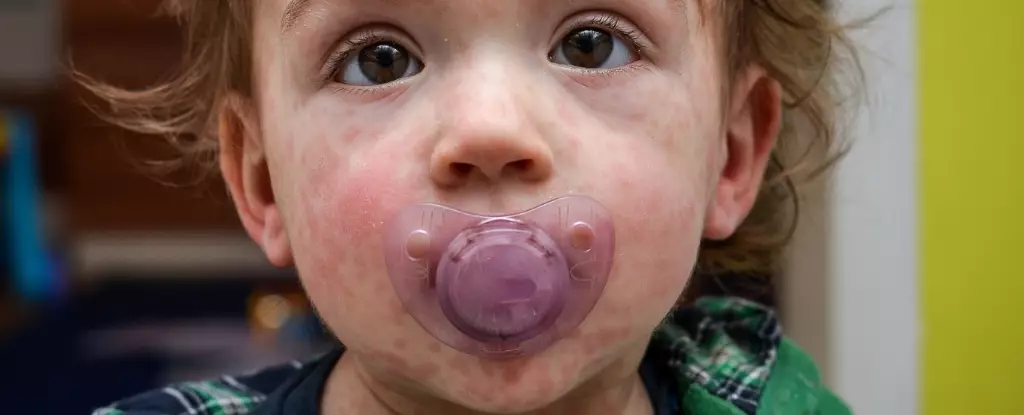In a troubling report released by the World Health Organization (WHO) and the Centers for Disease Control and Prevention (CDC), the year 2023 saw a staggering increase in measles infections, with global cases surpassing 10 million. This marks an eye-opening 20% spike compared to the previous year, underscoring significant weaknesses in vaccine distribution and uptake. Such an upsurge not only poses a serious public health risk but also reveals the critical need for immediate action to address the existing gaps in immunization programs worldwide.
Measles stands out as one of the most contagious diseases known, necessitating an ambitious target of at least 95% immunization coverage with two doses of the measles/rubella vaccine to avert widespread outbreaks. However, current statistics are concerning: only 83% of children worldwide received their first dose last year, a number stagnant since 2022 and notably lower than the pre-pandemic figure of 86%. Even more alarming, just 74% received their second dose. The implications of these statistics are severe, particularly in the context of a disease that can lead to serious complications—especially among young children.
Stressing the life-saving potential of the measles vaccine, WHO director-general Tedros Adhanom Ghebreyesus remarked that over the past five decades, the measles vaccine has been responsible for saving more lives than any other vaccination. His declaration highlights the crucial role that vaccination plays in protecting vulnerable populations. CDC director Mandy Cohen reinforced this sentiment, emphasizing that the measles vaccine remains the most effective barrier against the virus. Both leaders echoed a collective call for stronger investments in vaccination efforts, particularly targeting areas with low coverage.
Despite the proven efficacy of vaccines, the international health community faces a sobering reality: 57 countries reported significant measles outbreaks in 2023, soaring from 36 countries the year before. This trend is disturbing, especially as nearly every region except the Americas was affected, with the African continent experiencing nearly half of all substantial outbreaks. These figures illustrate an urgent need for focused efforts to increase immunization rates in regions disproportionately impacted by these outbreaks.
One of the most devastating consequences of the measles surge is its impact on mortality rates. The virus is estimated to have claimed the lives of approximately 107,500 individuals in 2023, a majority of whom were under the age of five. Although this reflects an 8% decrease from the previous year’s death toll, it nonetheless underscores the dire consequences of insufficient vaccination. The decrease can partly be attributed to better nutritional and healthcare access in regions where these outbreaks have occurred, allowing for a reduction in fatal outcomes for children affected by measles. However, these statistics still signify an unacceptable level of preventable deaths.
Organizations like the WHO and CDC have alarmingly noted that the ambitious goal of eliminating measles as an endemic threat by 2030 is under severe threat. By the conclusion of last year, only 82 countries had successfully achieved or sustained measles elimination. The recent reaffirmation of Brazil’s measles-free status provides a glimmer of hope for the Americas, which can now again be classified as free from endemic measles. Conversely, Africa remains a region that exemplifies the ongoing challenges in controlling this preventable disease.
In light of the alarming resurgence of measles, the WHO and CDC have called for urgent action, stressing the importance of achieving full vaccination coverage, particularly in regions heavily impacted by outbreaks, such as Africa and parts of the Eastern Mediterranean. The need for targeted immunization efforts in fragile and conflict-ridden areas is crucial in restoring health security on a global scale. The ability to prevent the transmission of measles hinges on collective action and sustained commitment to vaccinating every child, regardless of their geographic or socio-economic status.
As the world navigates the complexities of public health in a post-pandemic landscape, the fight against measles cannot be sidelined. With strategic investments and inclusive policy-making focused on vaccination efforts, communities can work towards achieving herd immunity, ultimately safeguarding future generations from this infectious disease. The current gap in vaccination coverage demands a concerted response—before the ramifications become even more catastrophic.


Leave a Reply